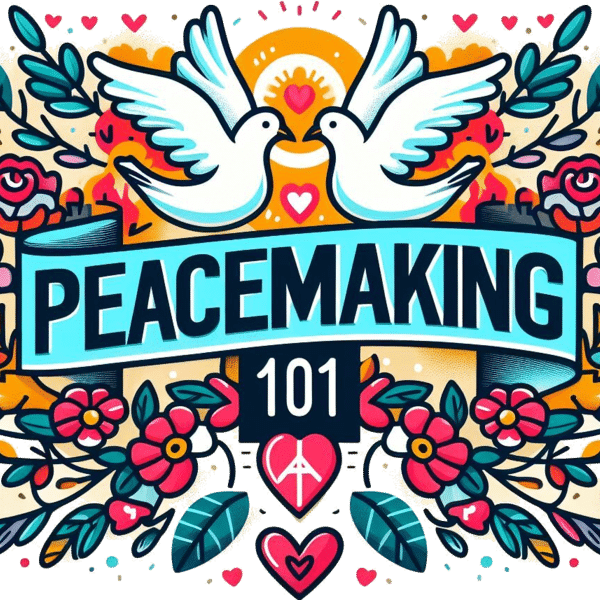Have you ever felt anger bubble up inside you, ready to burst like a shaken soda can?
Perhaps it’s a friend’s careless comment, a family disagreement, or the mounting pressure of daily life. We all experience anger, and it’s easy to let it control us, leading to hurt feelings and lost connections. But what if there was a way to channel that fiery energy into a force for good?
This is where peacemaking comes in. Join us as we delve into the “Unit 6 Peacemaking Principles” video, where you’ll discover powerful tools to transform anger into assertive communication and effective advocacy. Learn how to uncover the unmet needs behind your anger, express your wants and needs with respect, and even help others navigate their own emotional tides. Imagine turning conflict into collaboration, building stronger relationships, and becoming a beacon of peace in your own life.
P.S. Share this video with your friends and family who could benefit from learning peacemaking skills. We can all create a more peaceful world together!
Summary of “Unit 6 Peacemaking Principles”
Essential Points:
- Anger as Unmet Needs: Based on Marshall Rosenberg’s view, anger signals an unmet need. The script provides an exercise to identify feelings and needs to better understand this connection.
- Peacemaking Approach: 1) Manage anger constructively. 2) Assertively state wants/needs while respecting others’. 3) Advocate for needed changes.
- Key Principles:
- Anger is normal, aggression isn’t. Peacemakers help channel anger productively.
- Cooperation over competition: Encourage relational approaches for building strong bonds.
- The “silent technique”: Use silence strategically to encourage response and accountability.
- Teach assertive communication: Guide people to state wants/needs respectfully for cooperation.
- Advocate with emotional intelligence: Help people craft respectful, non-evaluative requests.
- “Wishes” vs. “Wants”: Soften demands with inclusive wishes for cooperation.
- Suggestions vs. Demands: Frame desires as questions for open discussion and better outcomes.
- Freedom vs. Imposition: Avoid imposing your wants, respect others’ autonomy.
- Freedom to Choose or Refuse: Accept and respect others’ choices, even if unconventional.
- Avoid Othering: Reframe “us vs. them” statements to promote equality and worthiness.
- Overall Purpose: Transform anger into effective peacemaking tools like assertiveness and advocacy. Peacemakers help parties move towards cooperation, assert needs respectfully, and craft solutions through emotional intelligence.
Additional Notes:
- The script emphasizes the importance of understanding and respecting underlying needs to effectively manage anger and resolve conflicts.
- Several concrete tips and techniques are provided, such as the “silent technique” and reframing othering statements.
- The lesson highlights the role of peacemakers in facilitating communication, promoting cooperation, and advocating for mutually beneficial solutions.
Reflection Questions on “Unit 6 Peacemaking Principles”
- Personal experience: Have you encountered situations where anger was the dominant emotion in a conflict? How did you (or could you have) apply the peacemaking principles discussed in the script?
- Understanding anger: Do you agree with the view that anger signals an unmet need? Can you think of examples from your own life where this was true?
- Self-reflection: How comfortable are you with your own anger? Do you tend to suppress it, express it aggressively, or find constructive ways to deal with it?
- Assertiveness vs. aggression: How can you distinguish between assertive communication and aggressive behavior in yourself and others? What challenges do you face in expressing your needs assertively?
- Advocacy in action: When might using the “silent technique” be an effective way to advocate for yourself or others? Are there situations where it might not be appropriate?
- Cooperation vs. competition: In your personal and professional relationships, how often do you find yourself falling into competitive rather than cooperative approaches? How can you be more mindful of shifting towards collaboration?
- Emotional intelligence and requests: How can you develop your emotional intelligence to craft requests that are more likely to be heard and accepted by others? What are some specific strategies you can try?
- Language and framing: In what ways can the language you use (e.g., “wish” vs. “want”, suggestions vs. demands) impact the outcome of a conflict? Can you think of past situations where your choice of words unintentionally escalated tension?
- Respecting autonomy: How can you strike a balance between advocating for your needs and respecting the autonomy and choices of others, even when they differ from your own?
- Challenging othering: How can you identify and challenge “us vs. them” thinking in yourself and others? What are some practical ways to reframe statements and promote inclusivity and understanding?
Feel free to adapt or explore these questions further based on your own experiences and areas of interest within the realm of peacemaking and conflict resolution.
